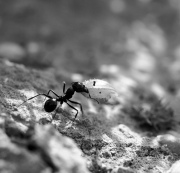Tags
Accumulating Glitches, ants, dinosaurs, Dyson sphere, evolution, music, neuroscience, Popular science, science, science and society, Science in Society, Scitable, Species, synesthesia, vampire
 It’s time for another Found while foraging! I’m going to do things slightly differently this time. Instead of just sharing various tidbits I’ve come across online since last time, I’m going to focus on science-related stuff to celebrate the recent launch of my new blog, Accumulating Glitches, as part of Nature’s Scitable network. I’d also like to take the opportunity to also point you towards some of my favourite posts from the other new blogs in the relaunched network. I hope you’ll find them enlightening and entertaining! As always, though, feel free to add more links in the comments!
It’s time for another Found while foraging! I’m going to do things slightly differently this time. Instead of just sharing various tidbits I’ve come across online since last time, I’m going to focus on science-related stuff to celebrate the recent launch of my new blog, Accumulating Glitches, as part of Nature’s Scitable network. I’d also like to take the opportunity to also point you towards some of my favourite posts from the other new blogs in the relaunched network. I hope you’ll find them enlightening and entertaining! As always, though, feel free to add more links in the comments!
- Khalil Cassimally, the community manager for Scitable, wrote a post introducing the relaunched network (kudos to Khalil for co-ordinating the whole thing!). Check it out for more about the network and links to all the new blogs!
- My inaugural post on Accumulating Glitches was about what “species” really means and whether or not they actually exist.
- This week on Accumulating Glitches, I wrote about water that’s been trapped beneath a Canadian mine for 1.5 billion years — what kind of life might we find there?
- Sarah Jane Alger will be writing Accumulating Glitches with me, but for now you can read her article about sex, dinner, and choosy spider males. Also be sure to check out her blog, The Scorpion and the Frog!
- On the environment blog, Kate Whittington wrote about how animals are adapting to cope with the lateness of Spring — and how it won’t last.
- Sara Mynott kicked off the oceanography blog with an article about whales with decompression sickness (aka “the bends”). Who’da thunk it?
- Bruce Braun will be writing about astronomy; this week, he introduced the fabled Dyson Spheres and explained why they’re worth looking for.
- Bradley Voytek explained how we estimate the number of neurons in a human brain on the neuroscience blog.
- Dana Smith takes us into the wonderful world of synesthesia! Am I the only one who’s jealous?
- It’s easy to forget that most of the life on Earth isn’t in jungles or rainforests. It’s not even in the oceans — it’s under them.
- Virginia Hughes write about how music can make people feel so good.
- An article on Mind Hacks describes an experiment showing how unnervingly easy it is to create prejudice and group favouritism. (B5 fans: purple or green?)
- Neuroskeptic writes about the difficulty in interpreting the results of fMRI, which has become an important tool in neuroscience lately.
- Bionumbers is a database full of important numbers in molecular biology, like the largest genome, the number of connections in our cortex (29,800 per neuron!), etc. Very useful and much easier than paging through textbooks or hunting through papers!
- It’s become cliché to point out that we’re all made of recycled star dust, but Khalil Cassimally’s thoughts on where his grandfather’s particles ended up make for a touching memento.
- Ed Young writes about research showing that birds are permanently crouching dinosaurs and Jon Tennant gives a great overview of the evolutionary history of dinosaurs. Oh, and xkcd reminds us that a T. rex has more in common with a sparrow than with a Steosaurus.
- Apparently you can rejuvenate old mice by pumping them full of young blood.
- Piotr Naskrecki writes about Melissotarsus ants which, amazingly, can’t stand up. Ever.
- More from Ed Yong: recalling memories puts them at risk of being overwritten.
- Finally, Jennifer Frazer describes how plants are able to make two completely different bodies using the same genome. I wish I’d spotted the article and written about it, but I’m happy to link to her excellent article instead.
- GrrlScientist draws our attention to the under-recognized entomologist and illustrator Maria Sibylla Merian, who was ” the first to depict all the different life stages and the chrysalis for each species on its particular food plant”.
- Arabic-speaking readers might be interested in Mouhannad Malek’s Youtube channel where he explains various scientific ideas in Arabic — sort of an Arabic Khan Academy.
- I’ve been enjoying Tania Browne’s new blog about epidemiology, especially this post where she explains the role of “privilege” and infrastructure in global health issues.
- Is wine tasting nothing but a farce? Robert Gonzalez seems to think so, and he makes a pretty strong case for it.
- And here’s a post from Peter Cawdron to provide some perspective on our place in the world.
That’s all from me this time!

Reblogged this on The Science Blog.